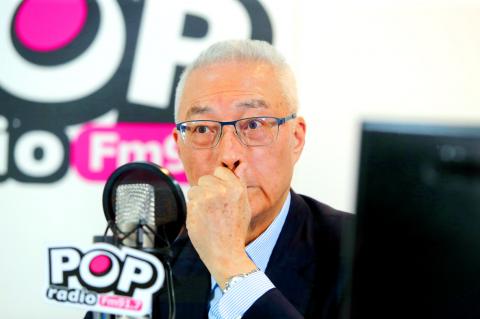Chinese Nationalist Party (KMT) Chairman Wu Den-yih (吳敦義) yesterday suggested that the party could “recruit” Kaohsiung Mayor Han Kuo-yu (韓國瑜) to join the party’s presidential primary.
The party’s plan to recruit Han would be a “fair” mechanism without hurting the party or Han, Wu said in a radio interview, but added that it would not do so if Han clearly refuses to join.
Asked how the party would decide on its nominee among many candidates, he said that the KMT prefers to conduct public opinion polls, instead of just among its members.

Photo: CNA
KMT headquarters on Wednesday granted a membership certificate to Hon Hai Precision Industry Co (鴻海集團) chairman Terry Gou (郭台銘) for lending the party NT$45 million (US$1.46 million at the current exchange rate) in 2016 without interest, Wu said, negating allegations that the move was aimed at helping Gou resolve his questionable membership so that he could take part in the primary.
After Gou received the certificate on Wednesday, he announced that he would participate in the party’s primary, saying that he would not accept being drafted to run.
He said that if he wins, he would stand as the KMT’s presidential candidate, and that if he loses, he would support whoever is selected.
Gou did not inform the party before announcing his decision to join the primary, Wu said yesterday, denying rumors that he and former president Ma Ying-jeou (馬英九) plotted for Gou’s participation to hinder Han.
Wu reaffirmed his objectivity, saying that he has decided not to contest the primary and that he would meet with Han, Gou and the other hopefuls — former New Taipei City mayor Eric Chu (朱立倫), KMT Legislator Wang Jin-pyng (王金平) and former Taipei County commissioner Chou Hsi-wei (周錫瑋) — to discuss the primary’s rules.
Referring to Wu’s remarks on recruiting Han, Chu said that the party’s primary plan “has changed from a romance film to an action movie to a science-fiction movie.”
He urged KMT headquarters to “provide a clear mechanism for the primary” to avoid losing supporters.
Wang also demanded a clearly defined primary mechanism, saying that it would allow candidates to feel secure in launching election campaigns.
Despite playing a role in helping Han win the mayoral election in November last year, Wang said that he would respect Han’s decision if he decides to enter the primary.
Gou yesterday said on Facebook that he anticipates a fair, just and open competition for the party’s nomination, adding that he would prove himself the best candidate during the primary.
Meanwhile, Han said that as mayor, his priority is to care about Kaohsiung’s residents and boost its economic development.
Additional reporting by Lin Hsin-han, Huang Chia-lin, Wang Jung-hsiang and Cho Yi-chun

INVESTIGATION: The case is the latest instance of a DPP figure being implicated in an espionage network accused of allegedly leaking information to Chinese intelligence Democratic Progressive Party (DPP) member Ho Jen-chieh (何仁傑) was detained and held incommunicado yesterday on suspicion of spying for China during his tenure as assistant to then-minister of foreign affairs Joseph Wu (吳釗燮). The Taipei District Prosecutors’ Office said Ho was implicated during its investigation into alleged spying activities by former Presidential Office consultant Wu Shang-yu (吳尚雨). Prosecutors said there is reason to believe Ho breached the National Security Act (國家安全法) by leaking classified Ministry of Foreign Affairs information to Chinese intelligence. Following interrogation, prosecutors petitioned the Taipei District Court to detain Ho, citing concerns over potential collusion or tampering of evidence. The

Seventy percent of middle and elementary schools now conduct English classes entirely in English, the Ministry of Education said, as it encourages schools nationwide to adopt this practice Minister of Education (MOE) Cheng Ying-yao (鄭英耀) is scheduled to present a report on the government’s bilingual education policy to the Legislative Yuan’s Education and Culture Committee today. The report would outline strategies aimed at expanding access to education, reducing regional disparities and improving talent cultivation. Implementation of bilingual education policies has varied across local governments, occasionally drawing public criticism. For example, some schools have required teachers of non-English subjects to pass English proficiency

NEGOTIATIONS: The US response to the countermeasures and plans Taiwan presented has been positive, including boosting procurement and investment, the president said Taiwan is included in the first group for trade negotiations with the US, President William Lai (賴清德) said yesterday, as he seeks to shield Taiwanese exporters from a 32 percent tariff. In Washington, US Trade Representative Jamieson Greer said in an interview on Fox News on Thursday that he would speak to his Taiwanese and Israeli counterparts yesterday about tariffs after holding a long discussion with the Vietnamese earlier. US President Donald Trump on Wednesday postponed punishing levies on multiple trade partners, including Taiwan, for three months after trillions of US dollars were wiped off global markets. He has maintained a 10 percent

TRADE: The premier pledged safeguards on ‘Made in Taiwan’ labeling, anti-dumping measures and stricter export controls to strengthen its position in trade talks Products labeled “made in Taiwan” must be genuinely made in Taiwan, Premier Cho Jung-tai (卓榮泰) said yesterday, vowing to enforce strict safeguards against “origin laundering” and initiate anti-dumping investigations to prevent China dumping its products in Taiwan. Cho made the remarks in a discussion session with representatives from industries in Kaohsiung. In response to the US government’s recent announcement of “reciprocal” tariffs on its trading partners, President William Lai (賴清德) and Cho last week began a series of consultations with industry leaders nationwide to gather feedback and address concerns. Taiwanese and US officials held a videoconference on Friday evening to discuss the